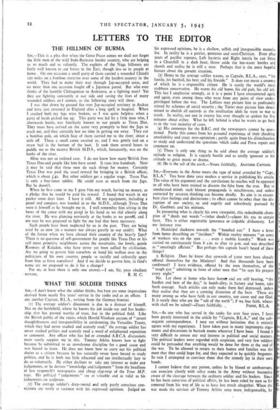THE HILLMEN OF BURMA
LETTERS TO
THE EDITOR
Stn,—This is a plea that when the Great Peace comes we shall not forget the little men of the wild Indo-Burmese border country, who are helping us so much and so valiantly. The exploits of the Naga hillsmen are fairly well known to our forces in the East, though less so to people at home. On one occasion a small party of them carried a wounded Chindit 120 miles on a bamboo stretcher over some of the hardest country in the world. They had to make their way through Jap-occupied areas, and on more than one occasion fought off a Japanese patrol. But who ever thinks of the humble Chittagonian or Arakanese as a fighting man? Yet they are fighting constantly at our side and saving the lives of many wounded soldiers an -I airmen, as the following story will show.
I was shot down by ground fire over Jap-occupied territory in Arakan and have just returned to England after a long spell in hospital. When I crashed both my legs were broken, so I was quite helpless when a party of locals picked me up. This party was led by a little man who, I afterwards learnt, was familiarly known to our people as Texas Dan. They must have arrived on the scene very promptly to beat the Japs to reach me, and they certainly lost no time in getting me away. They cut a bamboo pole, on which four of them carried me to the river; about a mile off. There a small canoe awaited us, and I was gently laid on a straw bed in the bottom of the boat. It took them several hours to paddle me to the nearest British M.D.S., which, fortunately, was on the banks of the river.
Mine was not an isolated case. I do not know how many British lives Texas Dan and people like him have saved. It runs into hundreds. Now it. may be said that these men do such things for money. Certainly Texas Dan was paid the usual reward for bringing in a British officer, which is about Lao. But other soldiers get a regular wage. Texas Dan is only a free-lance soldier. He could earn as much from the Japs. But he doesn't.
When he first came to me I gave him my watch, having no money, as a pledge that he would be paid his reward. I found that watch in my pocket some days later. I have it still. All my equipment, including a pistol and compass, was handed in to the M.D.S., although Texas Dan wore it himself as he brought me in. I well remember him sitting in the bows of the canoe with my pistol in his hand as we slid silently along the river. He was glancing nervously at the banks as we passed, and I am sure he was prepared to fight for me had that been necessary.
Such people have been neglected by us in the past. They are being used by us now (in a manner not always greatly to our credit). What of the future when we have cleared their country of the beastly Japs? There is no question of self-government for people like Texas Dan or his still more primitive neighbours across the mountains, the lovely, gentle Koomies of Kaladan, who have never yet been sullied by civilisation. Are we going to govern him ourselves or. hand his welfare over to the politicians of his own country, people as racially and culturally apart from him as from ourselves? And if we decide to govern him, in God's name are we prepared to do it for a change?
For me at least there is only one answer.--I am, Sir, your obedient


























 Previous page
Previous page